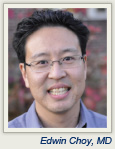 Historically, studying sarcoma has been problematic for several reasons. Sarcomas represent only about 1% of all adult cancers, and there are many subtypes, so getting a group of patients with one type of sarcoma together for a clinical trial in a single institution can be challenging. In the past, studies grouped several types of sarcomas together and that confounds the literature, because response rates and outcomes vary depending on subtypes accrued, said Edwin Choy, MD, Assistant Professor at Harvard Medical School and Massachusetts General Hospital, Boston.
Historically, studying sarcoma has been problematic for several reasons. Sarcomas represent only about 1% of all adult cancers, and there are many subtypes, so getting a group of patients with one type of sarcoma together for a clinical trial in a single institution can be challenging. In the past, studies grouped several types of sarcomas together and that confounds the literature, because response rates and outcomes vary depending on subtypes accrued, said Edwin Choy, MD, Assistant Professor at Harvard Medical School and Massachusetts General Hospital, Boston.
“Now the world of sarcoma research is more interconnected. The [Sarcoma Alliance for Research through Collaboration] makes it easier to conduct multi-institutional trials and ask meaningful sarcoma questions. These sarcomas are truly different diseases. Ewing sarcoma, for example, is an entirely different entity from gastrointestinal stromal tumor [GIST], just as breast and lung cancers are different. The correct way to study sarcomas is to identify the molecular driver of these malignancies and develop therapies targeted to those aberrations,” Dr. Choy stated. “The hope of the future and the current strategy for drug development is based on teasing out these molecular differences and targeting them.”
Advantages in Sarcoma Research
This strategy may be easier to apply in sarcomas than in other tumor types, because the sarcoma setting is thought to have some advantages. Many types occur in young people before they have been exposed to environmental carcinogens, and these types may have only a single molecular aberration to target. “We know that some types of sarcomas are genetically more straightforward than other tumor types. We know that GIST, dermatofibrosarcoma protuberans, and clear cell sarcomas are genetically simpler compared to carcinomas or other types of malignancies,” Dr. Choy said. ■
Disclosure: Dr. Choy is a paid consultant for Amgen and sanofi-aventis and receives research support from Novartis, Pharmacyclics, and AstraZeneca.

